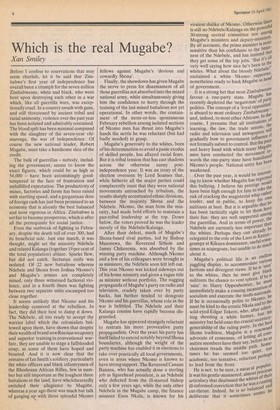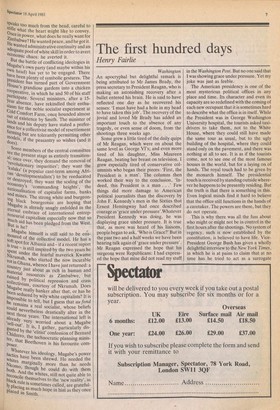Which is the real Mugabe?
Xan Smiley
Before I confess to reservations that may seem churlish, let it be said that Zim babwe's first year of independence has overall been a triumph for the seven million Zimbabweans, white and black, who were bent upon destroying each other in a war which, like all guerrilla wars, was exceptionally cruel. In a country awash with guns, and still threatened by ancient tribal and racial animosity, violence over the past year has been isolated and admirably contained.
The blood spilt has been minimal compared with the slaughter of the seven-year chimurenga, the war of independence. Of course the new national leader, Robert Mugabe, must take a handsome slice of the credit.
The bulk of guerrillas nobody, including the government; seems to know the exact figures, which could be as high as 54,000 have been astonishingly goodtempered in the face of frustration and unfulfilled expectation. The productivity of mines, factories and farms has been raised with startling speed, and a gargantuan dose of foreign cash has just been promised to an economy that is already the best balanced and most vigorous in Africa. Zimbabwe is set fair to become prosperous, which is after all the prerequisite for social justice.
Even the outbreak of fighting in February, despite the death toll of over 300, had its beneficial side. Just one match, it was thought, might set the minority Ndebele and related Kaianga (together 19 per cent of the total population) ablaze. Sparks flew, but did not catch. Sectarian strife was isolated. Of 22 new battalions wherein Ndebele and Shona from Joshua Nkomo's and Mugabe's armies are completely mixed, only three witnessed factional vio lence, and in a fourth there was fighting between two separate units encamped too close together.
It seems unlikely that Nkomo and his leadership connived at the rebellion. In fact, they did their best to damp it down. The Ndebele, all too ready to accept the warrior label which the colonialists begtowed upon them, have shown that despite their wealth of brand newRussian weaponry and superior training in conventional warfare, they are unable to stage a fullblooded coup, as some of them have hoped and boasted. And it is now clear that the remains of Ian Smith's soldiery, particularly the white officers and black infantrymen of the Rhodesian African Rifles, few in number but still important as the toughest three battalions in the land, have wholeheartedly switched their allegiance to Mugabe, whereas a year ago there was much bar talk of ganging up with those splendid Nkomo fellows against Mugabe's 'devious and cowardly Shona'.
Finally, the showdown has given Mugabe the nerve to press for disarmament of all those guerrillas not absorbed into the mixed national army, while simultaneously giving him the confidence to hurry through the training of the last mixed battalions not yet operational. In other words, the containment of the more-or-less spontaneous February rebellion among isolated sections of Nkomo men has thrust into Mugabe's hands the nettle he was reluctant (but had badly needed) to grasp.
Mugabe's generosity to the whites, born of his determination to avoid a panic exodus of skilled people, has allayed racial fears. But it is tribal tension that has cast shadows across the otherwise sunny postindependence year. It was an irony of the election overseen by Lord Soames that, while hitherto all the major parties could complacently insist that they were national movements untouched by tribalism, the results sharply accentuated ethnic divisions, between the majority Shona and the Ndebele. Nkomo, the man from the minority, had made bold efforts to maintain a pan-tribal leadership at the top. Down below, the voters proved he was the leader merely of the Ndebele/Kalanga.
After their defeat, much of Mugabe's Shona-based rival parties, led by Bishop Muzorewa, the Reverend Sithole and James Chikerema, was absorbed by the winning party machine. Although Nkomo and a few of his colleagues were brought in as ministers, the Ndebele soon felt left out. This year Nkomo was kicked sideways out of his home ministry and given a vague title as minister without portfolio. The nagging propaganda of Mugabe's party on radio and television, crudely taken over by party hacks, has further tended to denigrate Nkomo and his guerrillas, whose role in the war is belittled. The Ndebele and their Kalanga cousins have rapidly become disgruntled.
Mugabe has appeared strangely reluctant to restrain his more provocative party propagandists. Over the years his party has itself failed to extend notably beyond Shona boundaries, although the weight of the party machine has enabled it in elections to take over practically all local governments, even in areas where Nkomo is known to have strong support. The Reverend Canaan Banana, who has actually done a sterling job as figurehead president, is an Ndebele who defected from the ill-starred bishop only a few years ago, while the only other Ndebele in the Mugabe camp, the finance minister Enos Nkala, is known for his Spectator 18 April 1981 virulent dislike of Nkomo. Otherwise there is still no Ndebele/Kalanga on the powerful 30-strong central committee nor among Mugabe's ministers and deputy-ministers. By all accounts, the prime minister is more sensitive than his confidants to the bitter'. ness of the Ndebele, and has insisted that they get some of the top jobs. 'But it's all very well saying how nice he's been to the, whites. What about the bloody Ndehele °, orter, exclaimed a white Nkomo supp nonetheless ready to back Mugabe as head of government. It is a strong bet that most Zimbabweans favour a one-party state. Mugabe has recently deplored the 'negativism' of partY, politics. The concept of a 'loyal opposition is absurd to most ordinary and, indeed, to most other Africans. Zimbabweanis course, I presume that all institutio In ns ottie learning, the law, the trade unions, 1 radio and television and newspapers v11;.f gradually bow to government influence " not formally submit to control. But the Paee and heavy hand with which many Wee men have conducted the movement toci wards the one-party state have humiliate Nkomo's people. National unity has I'een weak ened . Over the past year, it would be interest; ing to know whether Mugabe has regrette,"; this bullying. I believe his prestige would have been high enough for him to take MC risk of cracking the magisterial whip rather louder, and in public, to keep his own militants at heel. But it is arguable that he has been tactically right to let them have their fun: they are well supportedaill°,hileg the guerrillas. And in terms of power. Ndebele are currently less important than the whites. Perhaps they can alreadY he relegated to the role of the Luos in Kenya-grumpy at Kikuyu dominance, useful Sometimes as scapegoats, but unable to do nine" about it. Mugabe's political life is an endless jugglingfactions adni ds p dl vy e, r tgoe nate cv emwms oldf aht ee is n ri jocuels; to the whites, then he must give Iliac! is ' militants the chance to vent spleen. If he t 'nice' to Harry Oppenheimer, he lutist immediately make a rousing incantation 01 socialism and execrate the multi-nationals. If he is occasionally polite to Nkomo, he. must be kind to the erratic Nkala and to the wild-eyed Edgar Tekere, who, after adm,1_!. ting shooting a white farmer, lost BIS ministry but held onto the crucial secretarrt generalship of the ruling party. In the hesA Shona tradition, Mugabe is a renowne' advocate of consensus, of letting all c°,_ 111,:s mittee members have their say, before he " chairman treads the middle path. Some,times he has seemed too quiet, t°' academic, too tentative, reluctant perhaPs to lead from the front. He is not, to be sure, a natural pornulist. It was his gentle-mannered, almostPreei°1.1.5r articulacy that disabused the whites of their ill-informed conviction that he was a rani cut-throat. Indeed, he is so balanced anhe deliberate that it sometimes seems Speaks too much from the head, careful to s,tifle what the heart might like to convey. unce in power, what does he really want for Zimbabwe? He wanted peace, and he got it. He wanted administrative continuity and an adequate pool of white skill in order to avert economic chaos: he averted it. But the battle of conflicting ideologies in Mugabe's own party (and maybe within his Own head) has yet to be engaged. There have been plenty of symbolic gestures. The President has turned part of Government House's grandiose gardens into a chicken cooperative, in which he and 50 of his staff ,,,Pariicipate. Several ministers, after a 15Year absence, have rekindled their enthusiasm for the noble socialist experiment at Cold Comfort Farm, oncg hounded almost °. ai of existence by Smith. The minister of lands and his deputy have stated a preference for a collectivist model of resettlement farming but are tolerantly permitting other Models, if the peasantry so wishes (and it does).
Some members of the central committee See the present stage as entirely transition:I': once over, they demand the removal of ?evolutionary impurities'; they want the kulaks' (a popular cant-term among African `developmentalists) to be reeducated or destroyed; they want the scaling a the economy'sthe `commanding heights', nationalisation of capitalist farms, banks and mines. The strong white and burgeon; .ng black bourgeoisie are hoping that milgabe is already snugly enfolded in the eternal embrace of international entrepreneurial capitalism especially now that so much aid has been But is he? pledged from the West. • Mugabe himself is still said to be enamoured of the collective model. He has a soft spot for Albania and— if a recent report is true — is still inspired by the two years he _spent under the fearful maverick Kwame . Nkrumah, who started the now incurable rot in Ghana, whence I have just returned: a °tint.), just about as rich in human and Material resources as Zimbabwe, but ruined by political repression and crass collectivism, courtesy of Nkrumah. Does Mugabe really hanker after that; or has he een seduced by wily white capitalists? It is iMpossible to tell, but I guess that au fond Ile remains a real socialist, whose beliefs could nevertheless drastically alter in the next three years. The international left is ,already very worried about a Mugabe sell-out'. It is, I gather, particularly disgusted by the `elitist' confession of Bernard Chidzero, the technocratic planning minis ter, that Beethoven is his favourite comPoser.
Whatever his ideology, Mugabe's power tactics have been shrewd. He needed the Whites marginally more than he needs Nkomo, though he could do with them both. And the whites, still not quite able to reconcile themselves to the 'new reality', as .black rule is sometimes called, are gratefully placing as much hope in him as they once Placed in Smith.







































 Previous page
Previous page